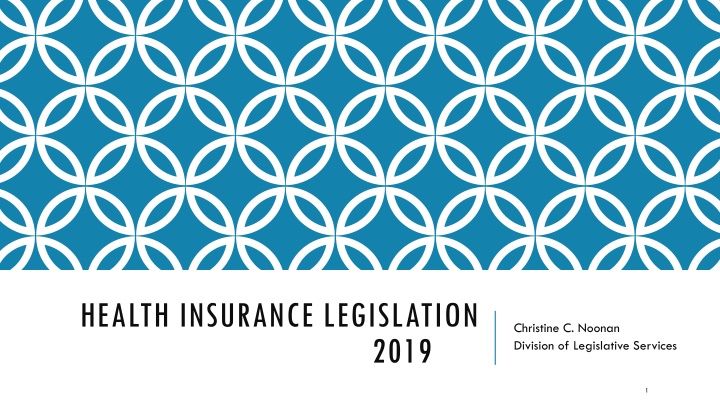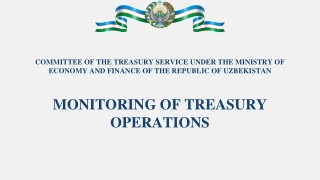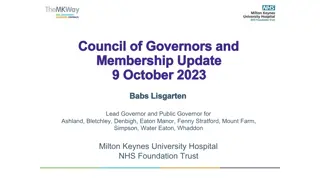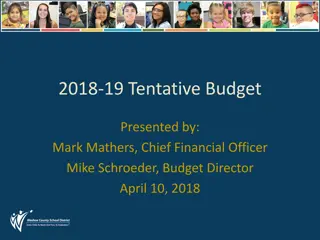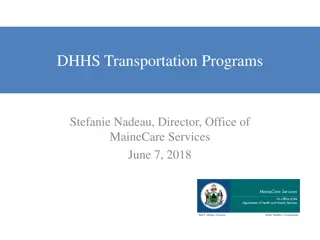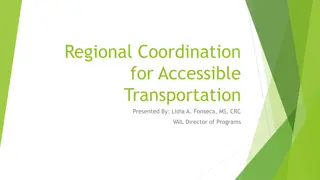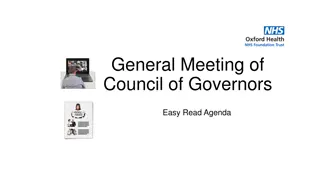Governors Budget Presentation to House Transportation Finance Committee
The presentation highlights the 10-year investment plan for transportation, addressing a projected $6 billion gap in funding needs for roads and bridges. Strategies focus on extending asset lifecycles, safety improvements, enhancing mobility, and meeting infrastructure condition targets. Funding components include implementing new revenues dedicated to roads and bridges.
Download Presentation

Please find below an Image/Link to download the presentation.
The content on the website is provided AS IS for your information and personal use only. It may not be sold, licensed, or shared on other websites without obtaining consent from the author.If you encounter any issues during the download, it is possible that the publisher has removed the file from their server.
You are allowed to download the files provided on this website for personal or commercial use, subject to the condition that they are used lawfully. All files are the property of their respective owners.
The content on the website is provided AS IS for your information and personal use only. It may not be sold, licensed, or shared on other websites without obtaining consent from the author.
E N D
Presentation Transcript
HEALTH INSURANCE LEGISLATION Christine C. Noonan Division of Legislative Services 2019 1
ENACTED LEGISLATION HB 1640 (Ransone) and SB 1178 (Sturtevant): Health carriers; services provided by nurse practitioners. Require health insurers and health services plan providers whose policies or contracts cover services that may be legally performed by licensed nurse practitioners to provide equal coverage for such services when rendered by a licensed nurse practitioner Enactment clause exempted the measures from HIRC review. HB 1682 (Ware): Dental services; contracts between carriers and providers; network arrangements. Establishes limits on the ability of a health carrier or third-party administrator to give a third-party carrier the right to include a dentist or oral surgeon in its provider network. HB 1915 (Yancey) and SB 1161 (Ruff): Cancer patients; expedited review of adverse coverage determinations. Covered person not required to exhaust health carrier's internal appeal process before seeking an external review of an adverse determination regarding coverage if the treatment is to treat his cancer. 2
ENACTED LEGISLATION HB 1970 (Kilgore) and SB 1221 (Chafin) Telemedicine services; payment and coverage of services. Require health carriers to cover medically necessary remote patient monitoring services as part of their coverage of telemedicine services to the full extent that the services are available. HB 2345 (Toscano): Individual and certain group health benefit plans; rates for plans, minimum loss ratios. Codifies certain provisions that are currently set out in regulations adopted by the SCC pertaining to the establishment of minimum loss ratios. HB 2515 (Hugo) and SB 1596 (Dunnavant): Health plans; calculation of enrollee's contribution; payments made on behalf of enrollee. Require health carriers to count any payments made by another person on the enrollee's behalf when calculating the enrollee's overall contribution to any out-of-pocket maximum. HB 2126 (Davis): Accident and sickness insurance; step therapy protocols. Requires that certain step therapy protocols are (i) developed and endorsed by a multidisciplinary panel of experts that manages conflicts of interest among the members; (ii) based on peer-reviewed research and medical practice; and (iii) continually updated based on a review of new evidence, research, and newly developed treatments. 3
ENACTED LEGISLATION HB 2538 (Ware): Balance billing; elective services. Requires a facility where a covered person receives scheduled elective services to post a notice, or inform the covered person at the time of pre-admission or pre-registration, that services provided by a provider group will be billed separately from the facility s charges and that some services may not be provided by an in-network provider. HB 2639 (Byron) and SB 1611 (Dunnavant): Health care shared savings; incentive programs. Require health carriers to establish a comparable health care service incentive program under which savings are shared with a covered person who elects to receive a covered service from a lower-cost provider. HB 2719 (Pillion) and SB 1475 (Deeds): Health insurance; small employers. Revises the definition of "small employer" for purposes of group health insurance policies to provide that an individual who performs services for (i) a corporation in which he is a shareholder or (ii) a limited liability company in which he is a member, regardless of the number of members of the limited liability company, shall be deemed to be an employee of the corporation or the limited liability company. Previously, only single-member entities were eligible for such treatment. HB 2577 (Thomas) and SB 1693 (Vogel): Health insurance; coverage for autism spectrum disorder. Require health carriers to provide coverage for the diagnosis and treatment of autism spectrum disorder in individuals of any age. The previous age limit was 10 years. 4
ENACTED LEGISLATION HB 2750 (Toscano) and SB 1004 (Chase): Advance estimate of patient payment amount for elective medical procedure, test, or service; notice of right to request. Provides that every hospital currently required to provide an estimate of the payment amount for an elective procedure, test, or service shall also be required to provide each patient with written information regarding his right to request an estimate, to post such information conspicuously in public areas of the hospital, and to make the information available on the hospital's website. HB 2770 (Murphy) and SB 1734 (Deeds): Accident and sickness insurance; restrictions relating to premium rates; variances in area rating factors. Requires a rate filing by a health carrier that proposes area rate factors (ARFs) in the individual or small group market that exceed the weighted average of the proposed ARFs among all rating areas by more than 15% to include a comparison of the ARF for individual and small group plans that utilize the same provider network and provider reimbursement levels of the health benefit plans that are subject to the filing. 5
ENACTED LEGISLATION HB 2798 (Garrett) and SB 1216 (Newman): All-Payer Claims Database. Require the Comm. of Health, with the BOI, to collect health claims data from certain insurers, corporations, managed care organizations, third-party administrators, and any self-funded employee welfare benefit plans (ERISA plans) whose employer has opted-in to the All-Payer Claims Database, DMAS, state government health insurance plans, local government health insurance plans, and federal health insurance plans. Currently, insurers have the option to provide data. SB 1197 (Dance): Pharmacies; freedom of choice. Requires carriers that provide exclusive provider policies and contracts to allow consumers freedom of choice for pharmacy benefits. Currently, such a requirement applies to other types of health carriers. 6
ENACTED LEGISLATION SB 1607 (Dunnavant): Health insurance; carrier business practices, authorization of health care services. Requires any provider contract between a health carrier and a participating health care provider contain certain provisions addressing how carriers interact with prior authorization requests. If a carrier has previously authorized an invasive or surgical health care service as medically necessary and during the procedure the health care provider discovers clinical evidence prompting the provider to perform a less or more extensive or complicated procedure than was previously authorized, then the carrier shall pay the claim. SB 1685 (Dunnavant): Health insurance; credentialing, mental health professionals. Requires health carriers that credential the mental health professionals in their provider networks to establish reasonable protocols and procedures for reimbursing a mental health professional who has submitted a completed credentialing application to a carrier, after being credentialed by the carrier, for mental health services provided to covered persons during the period in which the applicant's completed credentialing application is pending. 7
FAILED LEGISLATION 2019 8
BALANCE BILLING: EMERGENCY SERVICES Current law: ACA and 38.2-3445 Health carrier required to provide benefits for emergency services that provide OON provider with the greatest of (i) amount negotiated with in- network providers, (ii) usual, customary, and reasonable amount, and (iii) Medicare amount. However, balance billing is not prohibited. Despite progress, no consensus by the group on how to address balance billing in emergency services. Health carriers position: Stop balance billing but, in order to ensure viability of provider networks, do not increase to payments to OON providers. Last year, the HIRC directed interested parties to meet and develop a plan to address balance billing. Provider s position: Additional compensation to OON providers is appropriate, as they are giving up ability to balance bill. The group, moderated by the BOI, met two times in full and three additional times with only representatives from the health carriers and health care providers. 9
BALANCE BILLING: EMERGENCY SERVICES HB 2544 (Byron) Patient not required to pay to OON provider for emergency services any amount in excess of the amount the health carrier is required to pay for covered services except applicable cost- sharing amounts. Replaces one of the three tests for determining the benefit the carrier is required to provide to an OON provider of emergency services. Authorized an OON provider to request the BOI to determine whether the benefits that the carrier has determined to satisfy its obligation to provide benefits for emergency services provided. New test: Average of the health carrier s contracted commercial rates for the same emergency service in the geographic region. Old test: Amount negotiated with in- network providers for the emergency service, or if more than one, the median. 10
BALANCE BILLING: EMERGENCY SERVICES HB 1714 (Ware) Balance billing precluded if carrier makes direct payment to OON provider of appropriate amount. Adds to the 3-part test the regional commercial average (for providers) and fair market value (for facilities). Fair market value: price that is determined by considering the amounts billed to and accepted from all health carriers by similar providers for comparable OON emergency services in the community where the services were rendered. Medicare or Medicaid are excluded. Addressed the prudent layperson standard when re-examining based on final diagnosis. Failed in House Appropriations. SB 1763 (Sturtevant) Incorporated: SB 1228 (Chase), SB 1354 (McDougle), SB 1360 (Wagner) Emergency services sections identical to HB 1714. Also included notice provisions regarding ancillary services. Failed in House Appropriations, however the Budget Bill (Item 281) includes language creating a work group. Bills referred to Appropriations to address potential effect on state employee health plans. 11
BALANCE BILLING: EMERGENCY SERVICES Budget Bill (Item 281) Directs the Secretary of Health and Human Resources, in collaboration with the Secretary of Administration, Secretary of Finance, and SCC to convene a workgroup to evaluate options to prohibit the practice of balance billing by OON health care providers for emergency services rendered, and to establish equitable and fair reimbursement for these health care providers. Workgroup includes representatives from the Medical Society of Virginia, Virginia College of Emergency Physicians, Virginia Hospital and Healthcare Association, Virginia Association of Health Plans, Virginia Poverty Law Center, and National Patient Advocate Foundation. Directs workgroup to include in its report the fiscal impact of each option considered and the impact on provider networks. Also directs workgroup to include in its report (due Nov. 15, 2019) recommendations for legislation. 12
BALANCE BILLING: ANCILLARY SERVICES HB 1584 (Byron) Prohibited an out-of-network health care provider from charging a covered person who is insured through a health benefit plan an amount for ancillary services that is greater than the allowed amount the carrier is obligated to pay to the covered person. HB 2543 (Byron) Prohibited an out-of-network provider from balance billing a covered person for the costs of an ancillary service when an in-network provider referred the covered person to the out-of-network provider except unless, among other requirements, the covered person acknowledges in writing that using the OON provider may result in being balance billed. SB 1362 (Wagner) Passed by with a chairman's letter to HIRC. Only non-mandate bill referred to the HIRC. As introduced, identical to HB 2543 (Byron). Substitute offered requiring more stringent notice requirements, but not accepted by the Committee. 13
ASSOCIATION HEALTH PLANS HB 1661 (Head): Benefits consortium; formation by a sponsoring association as a nonprofit agricultural organization. Benefits consortium for nonprofit agricultural organization that is created primarily to promote programs for the development of rural communities and the economic stability and sustainability of farmers in the Commonwealth. Vetoed by the Governor after a proposed Amendment in the Nature of a Substitute (which would have made it identical to HB 2443 and SB 1689) was rejected at the reconvened session. HB 2443 (Wilt) and SB 1689 (Dunnavant): Group health benefit plans; benefits consortium. SB 1689 incorporated SB 1351 (Wagner), SB 1353 (Wagner), SB 1712 (Vogel). The bills would have made it easier for business organizations to establish health plans offered to member companies that are exempt from many insurance laws (as now exists for banking associations and private colleges). The bills were vetoed after an Amendment in the Nature of a Substitute was rejected at the reconvened session. 14
SHORT-TERM, LIMITED DURATION PLANS SB 1240 (Reeves): Health insurance; short-term, limited-duration plans. Authorized health insurance carriers in the Commonwealth to offer short-term, limited- duration health plans. Plans that have an expiration date that is less than 12 months after the original effective date of the contract, policy, or plan and, taking into account renewals or extensions, have a duration that does not exceed 36 months. Short-term health plans are required to include a specified disclaimer. Vetoed by the Governor. SB 1674 (Senator Reeves): Health insurance; short-term, limited-duration health plans, renewal guarantees. Provided for a guaranteed option , defined as a contract or agreement between a covered person and a carrier that guarantees the option of the covered person to purchase a new short- term, limited-duration health plan at a future date without re-underwriting. A guaranteed option is not a health benefit plan and that any guaranteed option may set a specified premium rate for any short-term, limited-duration health plan that it guarantees will be available to the covered person in the future. Vetoed by the Governor. 15
CATASTROPHIC HEALTH PLANS HB 2260 (Robinson) and SB 1027 (Sturtevant) Authorized the sale of catastrophic plans on the individual market. A catastrophic plan is a high-deductible health care plan that provides essential health benefits and coverage for at least three primary care visits per policy year. Under the Affordable Care Act, catastrophic plans satisfy requirements that health benefit plans provide minimum levels of coverage only if they cover individuals who are under 30 years of age or who qualify for a hardship exemption or affordability exemption. Both bills were vetoed by the Governor. SALE OF HEALTH POLICIES ACROSS STATE LINES SB 1006 (Chase) Established a procedure by which the SCC could have authorized health insurers licensed to sell health benefit plans in any other state to sell health benefit plans in Virginia without obtaining a license to engage in the business of insurance in Virginia or complying with other requirements applicable to Virginia-licensed insurers. Bill was stricken at the patron s request. 16
OTHER MARKET RESTRUCTURING APPROACHES HB 2516 (Hodges) Health insurance rate reviews; minimum anticipated loss ratios; pharmacy benefit price spread. Required the SCC to treat the price spread on any contract between the issuer of a health benefit plan and its pharmacy benefits manager as an administrative cost of the issuer. Required the issuer's administrative costs to be excluded from the amount of benefits provided under a health benefit plan when the Commission determines the health benefit plan's anticipated loss ratio. Codified portions of the SCC s regulations promulgated to implement the requirement that it review and approve the premium rates for health benefit plans. SB 1308 (Edwards): Prescription drugs; price gouging prohibited. SJ 312 (Deeds): JLARC study of the health benefit plan premium rate review process administered by the Bureau of Insurance. 17
OTHER MARKET RESTRUCTURING APPROACHES: COMMONWEALTH CARE HEALTH BENEFITS PROGRAM SB 1717 (Dunnavant) The House Substitute directed JLARC to review the implications of the establishment, implementation, and administration of the Commonwealth Care Health Benefits Program under which a division of the SCC, or nonprofit corporation established by the Commission, would be the sponsor of association health plans through which it would sell individual health insurance coverage in the Commonwealth. Failed in the House Rules Committee. The Program (based on introduced version) would replace participation in the federal Exchange with a program administered by a division of the SCC that would offer individual health coverage (through third-party administrators) as the sponsor of an association health plan. Elements of the Program included: Contingent on the approval of a state innovation waiver under 1332 of the ACA; Coverage would be at least as comprehensive and affordable as plans currently offered on the exchange pursuant to the ACA and comply with the ACA s guardrail requirements; The establishment of a reinsurance program; Subsidization of premiums for those with a household income between 100 and 400 % of the federal poverty level; and A cost-sharing reduction feature that removes disincentives to Program participation by low-income individuals enrolled in Medicaid. However, the Budget Bill directs the Joint Subcommittee for Health and Human Resources Oversight to consider options for a 1332 ACA waiver to redesign the individual insurance market to better align with cost saving opportunities and outcomes similar to the large group market. The joint subcommittee is directed to make recommendations, if any, to the General Assembly by December 15, 2019. 18
MANDATING COVERAGE FOR BENEFITS HB 1864 (Rodman)/ SB 1287 (Barker): Health insurance; nondiscrimination, gender identity or transgender status. SB 1185 (Favola): Health insurance coverage for contraceptives. SB 1344 (Favola): Health insurance; essential health benefits, preventive services. HB 2207 (Filler-Corn): Health insurance; coverage for contraceptives. HB 2378 (Price): Reproductive health services; health benefit plans required to cover costs. SB 1518 (Carrico): Non-opioid pharmacological therapy and non- pharmacological therapy; health insurance coverage. SB 1132 (Locke): Reproductive health services. 19
AGREEMENTS BETWEEN CARRIERS & PROVIDERS HB 2202 (Kilgore) and SB 1402 (Petersen): Health care provider panels; vertically integrated carriers, public hospitals. Required any vertically integrated carrier to offer to every public hospital participation in each provider panel or network established for each of the vertically integrated carrier's policies, products, and plans, including all policies, products, and plans offered to individuals, employers, and enrollees in state and federal government benefit programs. Dispute between Chesapeake Regional Medical Center, a public hospital, and Optima, a health carrier owned by Sentara Healthcare. SB was not taken up in House Commerce and Labor following efforts to negotiate a resolution. HB 2223 (O'Quinn): Pharmacies; delivery of prescription drugs, pharmacy benefits managers. Required every health carrier to administer its health benefit plans in a manner consistent with, or include in contracts for pharmacy benefits management, certain criteria and provisions regarding mail order pharmacies and retail community pharmacies. Passed by with letter to JCHC. 20
OTHER ISSUES HB 2427 (Levine): Health care services; payment estimates. Required hospitals to provide a patient scheduled to receive a nonemergency procedure, test, or service with an estimate of the payment amount for which the patient will be responsible no later than one week after scheduling such procedure. HB 2771 (Bell, Robert B.): Medicare supplement policies; switching plans. Authorized an individual to purchase any type of Medicare supplement policy, of any plan type, during an annual open enrollment period lasting 30 days or more. HJ 681 (Byron): JLARC; impact of changes in health care financing and delivery on charity care. Examination is to include the ability of provider to meet charity care requirements imposed by certificates of public need. HB 2531 (Head): Health Insurance Premium Payment program; enrollment of eligible individuals. Medicaid eligible individuals enrolled in an employer-provided health plan would be required to participate in HIPP, which provides reimbursement for a portion of the health plan premium, in lieu of providing Medicaid coverage. 21
